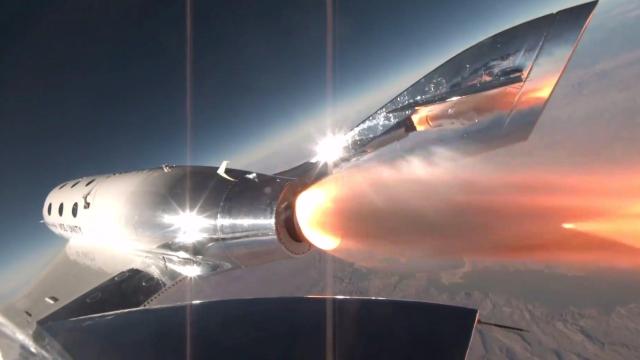After a few short trips to the edge of space, Virgin Galactic’s VSS Unity spaceplane is set for retirement, making room for a worthy successor. The company’s Delta class vehicle is gearing up for its debut in 2025, promising to bring in some profit with weekly suborbital flights.
Richard Branson’s space venture launched its commercial trips this summer, with the first crew taking off on June 29. Since then, the company has been hard at work sending more private passengers to suborbital heights on board the VSS Unity spaceplane. Virgin Galactic’s sixth commercial flight recently launched on November 2, carrying planetary scientist Alan Stern and science communicator Kellie Gerardi to the edge of space.
Shortly after its touchdown, however, Virgin Galactic announced that it was shifting its focus towards its next generation spaceplane. Unity is expected to fly two or three more times before being grounded in mid-2024, with all eyes now on the Delta spaceplane.
Frequent flyer
Compared to its predecessor, the Delta class vehicle will be larger and able to carry six passengers on board rather than Unity’s four-person capacity. The fourth seat has been used to carry a Virgin Galactic employee on board the suborbital flights.
The company also claims that the Delta vehicles will require less maintenance between flights, and will therefore be capable of launching up to twice a week. Unity, on the other hand, can only fly once a month.
The new Delta vehicle will have the same outer mold line as Unity, but its composite structure and avionics will be designed to make it lighter and faster to turn around between flights.
Delta also requires a new mothership. Virgin Galactic’s current mothership, the VMS Eve carrier, takes off while carrying the Unity spaceplane beneath its wings before releasing it at an altitude of 44,500 feet (13,500 meters) above the ground. Once released, the spaceplane fires up its rocket engines, lifting off to a maximum altitude of 54.2 miles (87 kilometers), which is a few miles shy of the internationally recognized boundary of space known as the Kármán Line.
For Delta, Virgin Galactic partnered with Aurora Flight Sciences, a Virginia-based Boeing subsidiary, to design and build its next-generation motherships. The new motherships are an upgraded version of Eve, designed to be faster to produce and easier to maintain to help the company scale up its operations.
Soaring revenue
Ultimately, Delta is designed to bring in more cash for Virgin Galactic’s space tourism business.
During an earnings call in August, the company announced a revenue of $US2 million in the second quarter of 2023 following the success of its first commercial flight but anticipated $US1 million in revenue for each of the next two quarters. The reason why Virgin Galactic’s flights haven’t racked in profit just yet is because the company sold about three-fourths of the first 800 tickets at a price tag between $US200,000 and $US250,000. Virgin Galactic later raised its ticket prices to $US450,000 each.
Virgin Galactic is hoping to see profits with its Delta vehicle, with each spaceplane costing between $US50 to $US60 million to produce and an estimated lifetime of 500 flights. With six passengers on board, each paying $US450,000 per ticket, that adds up to $US2.7 million in revenue for each flight while the operating costs per flight add up to around $US400,000. That means the potential profit for each suborbital trip is $US2.3 million.
No wonder the space company is eager to see its Delta class vehicles fly. The next generation spaceplanes will be put together at a new factory in Mesa, Arizona, which is expected to be operational by the end of this year. From there, Virgin Galactic wants to begin flight tests of the first Delta spaceplane in 2025, and to start launching commercial crews on the new vehicle in 2026.
That timeline may be a little ambitious as the company has not started production of its Delta vehicle yet. Its predecessor, Unity, also suffered some delays before it finally took off on its final test flight before ushering in the commercial flights. In May, the spaceplane reached the edge of space for the first time since July 2021 when six passengers, including Branson himself, hopped on the suborbital ride. The trip was meant to usher in the company’s commercial missions, but instead led to an investigation by the Federal Aviation Administration, as reports suggested that the spaceplane veered off course during its ascent.
Virgin Galactic is all in on Delta, and a lot is riding on the new spaceplane. “The Delta ships are powerful economic engines,” Michael Colglazier, Virgin’s chief executive officer, wrote in a memo to employees, according to SpaceNews. “To bring them into service, we need to extend our strong financial position and reduce our reliance on unpredictable capital markets. We will accomplish this, but it requires us to redirect our resources toward the Delta ships while streamlining and reducing our work outside of the Delta program.”
